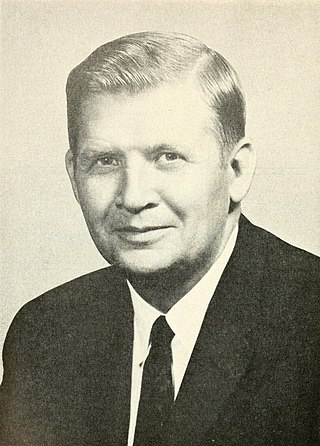
James Terry Sanford was an American lawyer and politician from North Carolina. A member of the Democratic Party, Sanford served as the 65th Governor of North Carolina from 1961 to 1965, was a two-time U.S. presidential candidate in the 1970s, and served as a U.S. senator from 1986 to 1993. He was a strong proponent of public education and introduced several reforms and new programs in North Carolina's schools and institutions of higher education as the state's governor. From 1970 to 1985, Sanford served as the president of Duke University.

Robert Burren Morgan was an American politician. He was a Democratic United States Senator from the state of North Carolina for a single term from 1975 to 1981.
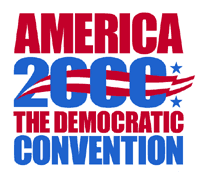
The 2000 Democratic National Convention was a quadrennial presidential nominating convention for the Democratic Party. The convention nominated Vice President Al Gore for president and Senator Joe Lieberman from Connecticut for vice president. The convention was held at the Staples Center in Los Angeles, California from August 14 to August 17, 2000. Gore accepted the presidential nomination on August 17, the final night of the convention.
Southern Democrats are members of the U.S. Democratic Party who reside in the Southern United States.

The 1966 United States Senate elections were elections on November 8, 1966, for the United States Senate which occurred midway through the second term of President Lyndon B. Johnson. The 33 seats of Class 2 were contested in regular elections. Special elections were also held to fill vacancies. With divisions in the Democratic base over the Vietnam War, and with the traditional mid-term advantage of the party not holding the presidency, the Republicans took three Democratic seats, thereby breaking Democrats' 2/3rds supermajority. Despite Republican gains, the balance remained overwhelmingly in favor of the Democrats, who retained a 64–36 majority. Democrats were further reduced to 63–37, following the death of Robert F. Kennedy in June 1968.

The 1964 United States Senate elections were held on November 3. The 33 seats of Class 1 were contested in regular elections. Special elections were also held to fill vacancies. They coincided with the election of President Lyndon B. Johnson by an overwhelming majority, to a full term. His Democratic Party picked up a net two seats from the Republicans. As of 2023, this was the last time either party has had a two-thirds majority in the Senate, which allowed the Senate Democrats to override a veto, propose constitutional amendments, or convict and expel certain officials without any votes from Senate Republicans. However, internal divisions would have prevented the Democrats from having done so. The Senate election cycle coincided with Democratic gains in the House in the same year.

The 1960 United States Senate election in North Carolina was held on November 8, 1960. Incumbent Democratic Senator B. Everett Jordan was re-elected to a full term in office, defeating Republican Wilkes County attorney R. Kyle Hayes.

The 2014 South Carolina gubernatorial election took place on November 4, 2014, to elect the Governor of South Carolina, concurrently with the regularly-scheduled election and special election to both of South Carolina's U.S. Senate seats, as well as other elections to the United States Senate in other states and elections to the United States House of Representatives and various state and local elections.

The 2014 United States Senate election in North Carolina took place on November 4, 2014, to elect a member of the United States Senate to represent the state of North Carolina, concurrently with other elections to the United States Senate in other states and elections to the United States House of Representatives and various state and local elections. The primary took place on May 6, 2014.
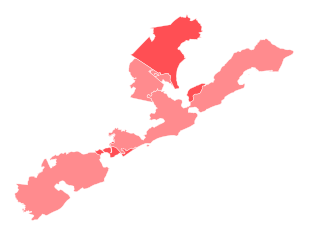
A special election for South Carolina's 1st congressional district was held on May 7, 2013, to fill the seat following the resignation of U.S. Representative Tim Scott, who was appointed to the United States Senate by Governor Nikki Haley to fill the seat previously held by Jim DeMint. DeMint resigned from the Senate on January 2, 2013, to accept a position as president of The Heritage Foundation.

The 1976 North Carolina gubernatorial election was held on November 2, 1976. Democratic nominee Jim Hunt defeated Republican nominee David T. Flaherty with 64.99% of the vote.
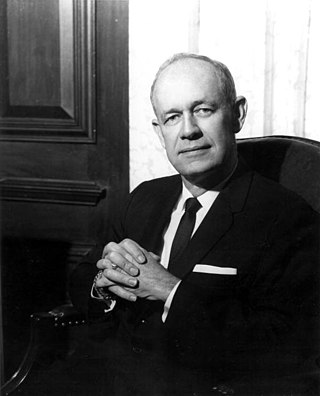
The 1960 Florida gubernatorial election was held on November 8, 1960. Democratic nominee C. Farris Bryant defeated Republican nominee George C. Petersen with 59.85% of the vote.

The 1972 North Carolina gubernatorial election was held on November 7, 1972. Republican nominee James Holshouser defeated Democratic nominee Skipper Bowles with 51% of the vote. Holshouser thus became the first Republican elected governor of the state since 1896.

The 1968 North Carolina gubernatorial election was held on November 5, 1968. Democratic nominee Robert W. Scott defeated Republican nominee Jim Gardner with 52.70% of the vote.

The 1964 North Carolina gubernatorial election was held on November 3, 1964. Democratic nominee Dan K. Moore defeated Republican nominee Robert L. Gavin with 56.59% of the vote.

The 1960 Kansas gubernatorial election was held on November 8, 1960. Republican nominee John Anderson Jr. defeated Democratic incumbent George Docking with 55.5% of the vote.

The 1952 North Carolina gubernatorial election was held on November 4, 1952. Democratic nominee William B. Umstead defeated Republican nominee Herbert F. "Chub" Seawell Jr. with 67.50% of the vote.
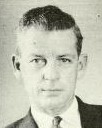
Malcolm Buie Seawell was an American lawyer and politician. A member of the Democratic Party, he served as North Carolina Attorney General from 1958 to 1960. Seawell was raised in Lee County, North Carolina. After law school, he moved to Lumberton and joined a law firm. From 1942 to 1945 he worked for the U.S. Department of War in Washington, D.C. He then returned to Lumberton and successfully ran for the office of mayor in 1947. He held the post until the following year when he was appointed 9th Solicitorial District Solicitor. While working as solicitor Seawell gained state-wide prominence for his aggressive efforts to prosecute the Ku Klux Klan (KKK), and was credited for ultimately pushing the organization out of Robeson County. Governor Luther H. Hodges later made him a judge before appointing him Attorney General of North Carolina in 1958 to fill a vacancy.

Robert Lee Gavin was an American attorney and politician.
New South governor is a term applied to various governors who led states in the Southern United States in the latter half of the twentieth century. Politically moderate, these governors were viewed as broadly progressive, avoiding racial rhetoric and advocating reform of government institutions.















